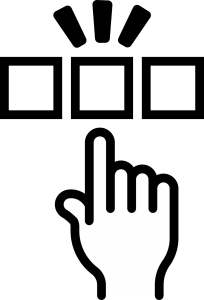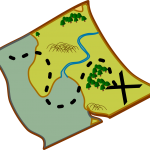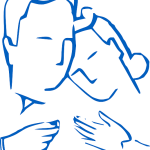Main Body
The Story of Jim Egan
Learning Goals
At the end of this lesson, you will be able to:
- Understand and use new vocabulary words
- Read words that end with -tion and -sion
- Think about how to describe characters in a text
- Spell the plural form of more words
- Use an apostrophe to show who owns what
- Write another paragraph that tells a story

Get Ready to Read
- What is homophobia?
- Have you seen or experienced homophobia?
Vocabulary
Figure out what the bold word means by looking at how it is used in the sentence. Match it to the best meaning.
| 1. At one time, the word queer was an insult. Today, it is a word many people proudly use to describe themselves. | a. To unfairly treat a person differently from other people |
| 2. “The state has no place in the bedrooms of the nation.” | b. The government |
| 3. Jim returned to queer activism — and this time, Jack was right by his side. They helped run an AIDS organization. They also ran a drop-in group for queer people out of their home. | c. Someone whose gender or romantic relationships are outside of what is traditional |
| 4. The courts made it illegal to discriminate based on who people are attracted to. | d. Doing things that support change in the world |
Write an answer for each question using the word in bold. Write in complete sentences.
- Can you think of any TV or movie characters you like who are queer?
- Do you know anyone who is involved in activism? Who?
Word Attack Strategy
Word Patterns
The suffixes –tion and –sion are pronounced /shun/.
Sound out the word. Match it to the best picture.
| 1 | lo – tion |
| 2 | va – ca – tion |
| 3 | gas sta – tion |
| 4 | ac – tion |
| 5 | lo – ca – tion |
| 6 | vi – sion |
| 7 | de – ci – sion |
| 8 | di – vi – sion |
| 9 | na – tion |
| 10 | re – la – tion – ship |
a.  |
b.  |
c.  |
d.  |
e.  |
f.  |
g. |
h.  |
i.  |
j.  |
Use Your Reading Skills
Read The Story of Jim Egan in your reader. Return to this page when you are done.
Check Your Understanding
Find the Topic and Main Idea
1. What is the topic of this text?
a. AIDS
b. Queer people
c. Jim Egan
2. What is the main idea of this text?
a. This text tells the story of how Jim Egan stood up for the rights of queer people in Canada.
b. This text describes how the media used to talk about queer people.
c. This text is about how to take the government to court.
3. Fill in a Sum It Up sheet for this text. In the details boxes, write down three ways Jim Egan stood up for the rights of queer people in Canada.
4. Using your answers above, write a short summary of this text. Include the topic, main idea, and your supporting details.
Understanding Characters
A person’s actions can tell us something about their personality.
Think about the characters’ actions below. Match the character with an adjective from the box below. Use a dictionary for any words you do not know.
| open-minded | brave | active |
| determined | careful |
| Character’s Actions | Adjective |
| 1. Jim spoke up about gay rights at a time when no one else would. | |
| 2. Prime Minister Pierre Trudeau got rid of the law that made queer relationships illegal. | |
| 3. Jack and Jim helped run an AIDS organization and a drop-in group. | |
| 4. Jack and Jim spent eight years fighting the government in court for equal rights. | |
| 5. Jack thought Jim should give up his activism in case he got arrested. |
Grammar
Plural Nouns
In the last chapter, you learned some rules for making words plural. Here are some more rules for making words plural.
| Singular | Plural | Rule |
|
One hero One potato |
Two heroes Two potatoes |
If a word ends in a consonant + o, add –es. |
|
One life One knife One wife One wolf |
Two lives Two knives Two wives Two wolves |
For most words ending in f, change the f to v and add –es. |
|
One child One woman One person One foot |
Two children Two women Two people Two feet |
Some plurals are irregular. They do not follow a pattern. |
Make these words plural.
1. man
2. loaf
3. half
4. scarf
5. radio
6. leaf
7. tooth
8. tomato
9. goose
10. elf
Using an Apostrophe to Show Who Owns What
Look at these phrases:
- Joy’s house in Vancouver was going to be torn down.
- Gay men’s names were printed in newspapers.
- Tommy stood up for workers’ rights.
Why is there an apostrophe (’) in each phrase? The apostrophe shows who owns what.
- The house belongs to Joy.
- The names belong to the men.
- The rights belong to the workers.
Grammar Rule
Here are the rules for adding an apostrophe:
| If… | Example | Add |
| The owner is singular | Joy’s house | ’s |
| The owner is plural and does not end in s | men’s names | ’s |
| The owner is plural and ends in s | workers’ rights | ’ |
Add apostrophes as needed.
1. A large number of First Nations cultures traditionally believed in many genders. Some peoples spirits were seen as a mix of male and female. Today, these people refer to themselves as Two-Spirit.
2. In the past, Two-Spirit people wore a mix of mens clothing and womens clothing.
3. Two-Spirit people also had special roles. If a childs parents were not raising him or her well, a Two-Spirit person was often asked to raise the child. Two-Spirit people were also teachers, artists, and healers.
4. Two-Spirit people challenged Europeans belief in only two genders: male and female. For this, Europeans killed many Two-Spirit people.
5. Canadas laws were written to make First Nations people more like white people. As a result, the tradition of Two-Spirit people was almost lost.
6. In 1990, there was a large gathering of Two-Spirit people in Manitobas capital, the city of Winnipeg. They began a movement to relearn their traditional roles.
7. Two-Spirit people have shown great strength as they work to find acceptance in todays world.
Writing
Writing Task
All of the people whose stories you have read have at least one thing in common — they were all brave. Think of a time when you were brave and write a paragraph to tell your story. Follow these steps:
- Use the Tell a Story sheet to plan your paragraph.
- Then, write a first draft. For an extra challenge, try using at least one possessive apostrophe and some adjectives.
- Next, edit your paragraph using the checklist below.
- Finally, give your paragraph to your instructor.
Checklist:
- Does my story have a beginning, middle, and end?
- Did I use linking words: first, then, next, finally?
- Are the events told in an order that makes sense?
- Did I use complete sentences, starting with capital letters and ending with a period (.), a question mark (?), or an exclamation mark (!)?
- Did I use irregular verbs correctly?
- Did I use apostrophes correctly?
- Are words spelled correctly?
Answer Key
| Vocabulary | |
| QUESTION | ANSWER |
| 1 | c |
| 2 | b |
| 3 | d |
| 4 | a |
| Word Attack Strategy | |
| QUESTION | ANSWER |
| 1 | e |
| 2 | g |
| 3 | i |
| 4 | a |
| 5 | f |
| 6 | b |
| 7 | d |
| 8 | h |
| 9 | c |
| 10 | j |
| Check Your Understanding | |
| Find the Topic and Main Idea | |
| QUESTION | ANSWER |
| 1 | c |
| 2 | a |
| Understanding Characters | |
| QUESTION | ANSWER |
| 1 | brave |
| 2 | open-minded |
| 3 | active |
| 4 | determined |
| 5 | careful |
| Grammar | |
| Plural Nouns | |
| QUESTION | ANSWER |
| 1 | men |
| 2 | loaves |
| 3 | halves |
| 4 | scarves |
| 5 | radios |
| 6 | leaves |
| 7 | teeth |
| 8 | tomatoes |
| 9 | geese |
| 10 | elves |
| Using an Apostrophe – Possession | |
| QUESTION | ANSWER |
| 1 | people’s spirits |
| 2 | men’s clothing, women’s clothing |
| 3 | child’s parents |
| 4 | Europeans’ belief |
| 5 | Canada’s laws |
| 6 | Manitoba’s capital |
| 7 | today’s world |
Attributions
Rainbow flag
Rainbow flag and blue skies by Ludovic Bertron is used under a CC BY 2.0 license.
Photo a by OpenClips is in the public domain.
Photo b by Nemo is in the public domain.
Photo c by OpenClips is in the public domain.
Photo d by kerr63 is in the public domain.
Photo e by Nemo is in the public domain.
Photo f by Nemo is in the public domain.
Photo g by OpenClips is in the public domain.
Photo h by Nemo is in the public domain.
Photo i by Nemo is in the public domain.
Photo j by Nemo is in the public domain.

